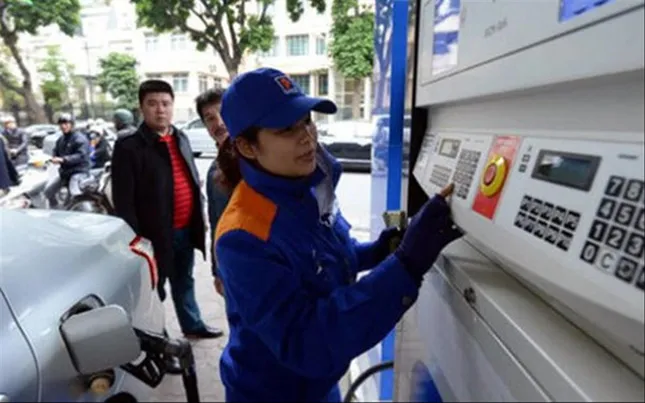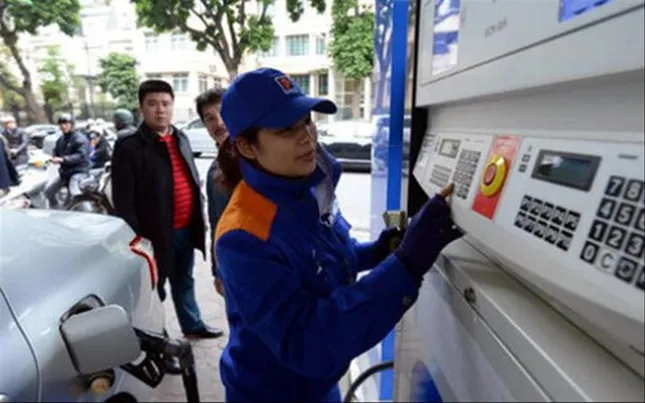Sharing with Tiền Phong on June 27, Mr. Nguyen Xuan Thang, Director of Au Hai Phat Gas and Oil Company (Lam Dong), said that for the past two weeks, retailers have been struggling as discounts have dropped significantly, even reaching 0 VND on some days, resulting in losses of 700-1,000 VND per liter for businesses.

Fuel companies want prices to be adjusted quickly and closely to the market. Photo: Nhu Y
According to Mr. Thang, what frustrates retailers the most currently is that their suggestions regarding profit-sharing norms and controlling discounts offered by wholesale companies are falling on deaf ears at the Ministry of Industry and Trade. “For the past two weeks, discounts have been extremely low, even reaching 0 VND, causing significant losses for businesses. However, just yesterday, after a price increase of 260-280 VND, the wholesalers immediately pushed the discounts up to offload their stocks. Why didn’t they maintain a discount of 1,000 VND per liter instead of reducing it to almost 0 VND? Every time there’s a price fluctuation, the wholesalers manipulate the discounts. After the price increase, they suddenly raise the discounts, leaving retailers unable to cope as sales are typically lower towards the end of the week. This ‘playing both sides’ tactic has been going on for years without any intervention from the Ministry of Industry and Trade,” Mr. Thang lamented.
“Fuel companies have been suffering significant losses since 2021 due to the management agency’s policies. At this point, I just want to exit this industry as soon as possible because our feedback on the draft decree on fuel and our difficulties have fallen on deaf ears at the Ministry of Industry and Trade, which is the governing body. Many of my colleagues in the industry have also decided to sell their gas stations, giving up on something they’ve dedicated their lives to, and switching to high-tech agriculture because they can no longer bear the prolonged losses and the pressure of staying open even when they’re making a loss, all while bearing the unfair blame,”
Director of a fuel company in the southern region
The director of a large fuel company in the north confirmed that fuel companies are facing losses due to the continuous decrease in discounts from wholesalers since June 14. Even though retail prices have been adjusted upwards, the significant drop in discounts has left companies unable to compensate for the costs of procuring stock from locations over 300km away. With a discount of 0 VND and additional transportation and operational costs, companies are facing substantial losses. “I’m supposed to be a fuel company owner, but my annual income is less than that of a grocery store. It’s exhausting,” they shared.
“The discounts have been drastically reduced, and the wholesalers and distributors have also restricted our sales volume. With the sharp decline in discounts over the past two weeks, we estimate a loss of 900-1,200 VND per liter of fuel sold.”
Representative of a fuel company
The director of a fuel retail company in Hanoi shared that June 24 was the most challenging day as the discounts at many warehouses plummeted, resulting in significant losses for the business. To ensure supply continuity and avoid penalties from authorities, he had to reluctantly purchase stock at a negative discount of 30 VND per liter from a warehouse. Factoring in transportation costs of 250 VND per liter and other expenses, the company incurred a loss of 1,100 VND per liter sold. Notably, with such volatile global oil prices, the management agencies, namely the Ministry of Industry and Trade and the Ministry of Finance, should closely monitor the market, heed the concerns of businesses, and promptly advise on price adjustments to prevent losses for companies due to declining discounts.
“On June 24, the global oil price suddenly dropped by 2.99% to 66.46 USD per barrel, causing uncertainty among wholesalers, who responded by slashing discounts, resulting in a loss of over 1,000 VND per liter of fuel sold for retailers. This scenario has played out before, and the authorities should have learned from past experiences,” the director shared.
A representative of a fuel company in the southern region expressed frustration over the continuous decline in discounts since the beginning of the week, leaving them counting losses. According to this representative, fuel businesses have never faced such challenges as in the past few years. The fuel crisis in 2022, caused by the Ministry of Industry and Trade’s management policies, already pushed companies to their limits, and there is now a risk of a repeat as continuous discount reductions leave companies unable to cover operational costs. To survive, the company has had to sell some of its gas stations and diversify into pesticide sales, coffee, and real estate investments to subsidize the fuel business. Without these additional sources of income, the company would have shut down long ago.
















